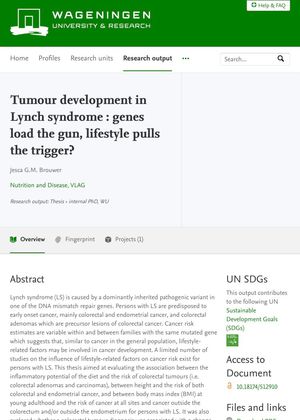Tumor Development in Lynch Syndrome: Genes Load the Gun, Lifestyle Pulls the Trigger?
September 2020

TLDR Lifestyle factors like BMI at young adulthood can increase cancer risk in women with Lynch Syndrome, but diet and height don't seem to affect this risk.
The thesis from 2020 investigated the influence of lifestyle-related factors on cancer risk in individuals with Lynch Syndrome (LS), a condition that predisposes individuals to early onset cancer, primarily colorectal and endometrial cancer. The study used data from the GEOLynch study and the Colon Cancer Family Registry, involving 457 participants for dietary intake, 1155 men and 1553 women for height, and 1044 men and 1446 women for Body Mass Index (BMI) at young adulthood. The study found no association between the inflammatory potential of diet and the risk of colorectal tumours, or between height and the risk of colorectal and endometrial cancer. However, a 5 kg/m2 increase in BMI at young adulthood was associated with an increased risk of cancer at all sites for women, but not for men. The study also found that a colorectal tumour diagnosis did not trigger a change in lifestyle habits. The results suggest that current cancer prevention recommendations for the general population may also be applicable to individuals with LS.